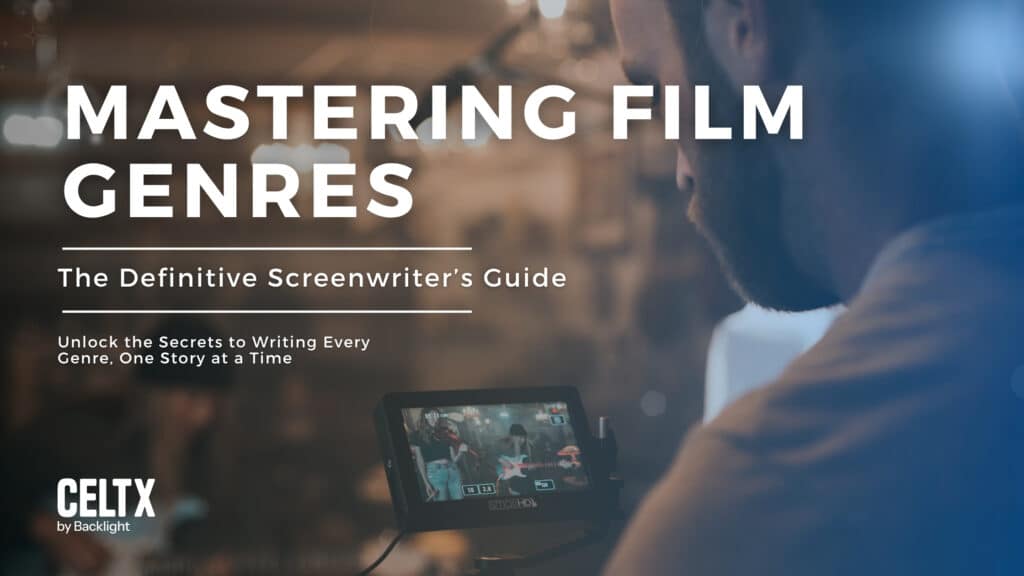
Welcome to the Celtx Screenwriting Series! This guide—Mastering the Art of Screenwriting —is your go-to resource for writing in every genre.
Whether you’re starting with a blank page or refining your final draft, this series is here to meet you where you are. This isn’t just a basic “how-to” guide ; it’s a genre-focused, emotionally honest look at what it truly takes to write a script that resonates. (But if you’d like a guide focused on structure, we have that, too!)
From horror to romance, sci-fi to drama, each entry breaks down the unique elements that define a film genre. Together, these genre blogs form a masterclass in developing your screenwriting craft across formats, moods, and storytelling conventions.
Why Genre Matters: Your Blueprint and Your Sandbox
Understanding genre is the first step toward writing a powerful script. It is the language you speak to your audience, and it gives your story shape.
First, let’s start at the beginning: what is a film genre? To put it simply:
A film genre is a category of movies that share similar narrative, stylistic, and subject matter conventions. By grouping films based on these shared characteristics, such as common plot elements, themes, and stylistic patterns, audiences and critics can understand and categorize movies.
Examples include action, horror, science fiction, and comedy.
Now that we’ve got that cleared up, why does understanding film genres matter?
Well, let’s think about how understanding genre helps us as writers:
- It gives structure to your ideas.
- It helps manage pacing and tone.
- It sets expectations for your audience.
- It gives you something to subvert (intentionally!).
Mastering genre gives you room to play. Whether you gravitate toward suspense, snappy comedy, or intimate drama, your natural instincts will start to reveal themselves within the conventions of the genre. Trust your unique perspective — your voice is your most valuable asset.

Tool Integration: Perfecting Genre Pacing
Because structure and pacing are so vital to genre, we recommend using Celtx Beat Sheets. This tool allows you to visually map out your story’s critical plot points and perfect your genre pacing from the very first draft.
The Master Index: Exploring Film Genres
Over the course of this series, we explore all the core screenwriting genres, with breakdowns of structure, tone, pacing, and pitfalls to avoid. Whether you want to write a laugh-out-loud comedy or a gripping thriller, we’ve got you covered.
By exploring this master index, you will learn how to tackle specific film genres with precision and authenticity, and how to approach structure, pacing, dialogue, and tone within each one.

Click on the links below to dive into the genre that speaks to you:
- Horror: From Dreams to Screams
- Horror: How to Write a Horror Script Part 2
- Science Fiction: Beyond the Stars
- Comedy: Timing, Characters, and Chaos
- Drama: Human Stories, High Stakes
- Rom-Com: From Meet-Cutes to Happy Endings
- Holiday: Crafting Seasonal Magic
- Documentary: Research and Reality
- Skit: Writing Punchlines that Land
- Romance: How to Sweep Audiences Off Their Feet
- Mystery: Leaving Breadcrumbs Without Losing the Plot
- Musical: Writing Rhythm & Emotion
- Action: Writing Momentum on the Page
- Fantasy: Legacy and Lore
- Historical/Period: Pieces with a Punch – Writing a Historical Script
- Adventure: From Quests to Climax
- Childrens: Magic, Mischief & Morals
- Thriller: Suspense, Tension & Surprise
- Western: Morality, Myth, and the Open Range
- Crime: Coming soon
- Experimental: Coming Soon
- What other genres would you like to see?
📌 Bookmark this page—we’ll update this index as new genres are added.

Revision by Genre: Where Scripts Become Stories
Once you’ve typed FADE OUT, the real work begins. Rewriting isn’t just polishing — it’s where your script becomes the story. Revisions are where good scripts become great.
Revisions help you step back, spot flat arcs or clunky dialogue , and clarify what matters most in your story. The process of revision changes depending on your film genre: you might be tightening the suspense in a thriller, or clarifying emotional stakes in a drama.
In each entry to this series, we walk you through how to revise by genre, focusing on what actually matters in each script.
Tool Integration: Tracking Changes with Clarity
Celtx makes the revision process easier and more organized:
- Notes: Want to track your revisions and notes in one place? Celtx lets you add comments and scene notes directly.
- Revision Mode: Track your changes and build your script with clarity.
- Drag-and-Drop: Easily move scenes around and restructure your script.
Click here to sign up – it’s free!
Celtx Tools to Support Your Journey
Writing is hard. Celtx makes it easier. Turn your ideas into a working script and move toward production with the right tools from the start.
Our specialized writing tools include:
- Beat Sheets → Perfect your genre pacing from draft one.
- Script Goals & Insights → Set writing goals and analyze your dialogue vs. action balance.
- Read Through → Hear how your scenes and dialogue sound aloud.
- Collaborators → Work with others, even if they don’t have Celtx.
When you’re ready to move from script to screen, Celtx supports your full workflow:
- Call Sheets → Move toward production
- Production Catalog → Manage cast, props, and assets
- Storyboards → Plan out every shot before you start shooting
- Scheduling and Stripboards → Plan your shoot
Start free with Celtx and bring your story to life with the right tools from the start.

FAQs
Film genres are categories used to classify movies based on shared conventions, themes, and narrative elements (e.g., Horror, Comedy, Sci-Fi). They are important because understanding genre gives your ideas structure, helps manage pacing and tone, sets audience expectations, and provides a framework you can intentionally subvert
No. This series is built to meet you where you are. Whether you’re writing your first script or your fifteenth, this masterclass gives you the tools to grow by focusing on advanced, genre-specific concepts.
This series focuses on genre mastery, not basic formatting. However, we have other helpful articles on Screenwriting Essentials that cover basics like script formatting, how to write a logline, and character profiles.
Celtx provides tools that are critical for managing genre conventions. For example, Beat Sheets help you nail the specific pacing required for a script , and Script Goals & Insights analyze your dialogue-to-action balance, which is vital for setting the right tone.
Conclusion: Your Story Starts Here
Screenwriting is a craft—and like any craft, it’s shaped by practice, patience, and perspective. Whether you’re outlining your first script or exploring a new genre, we hope this series gives you the tools and encouragement to keep writing.
We’d love to hear from you, too. What genre should we cover next? What’s been the hardest part of writing for you? Drop us a comment, tag us on social, or send a message—this series was built for you, and your feedback helps shape what comes next.
Let’s keep the conversation going. Your next scene starts now.
Focus on your story, not your formatting.
Let Celtx’s Script Editor automatically apply all industry rules while you focus on the story.
Screenwriting 101:
- Script Formatting Basics
- How to Write a Logline [Video and Examples Included]
- How to Structure a Screenplay
- Building Better Characters: What is a Character Profile and How to Use It
- 10 Tips for Writing Dialogue That Feels Real

